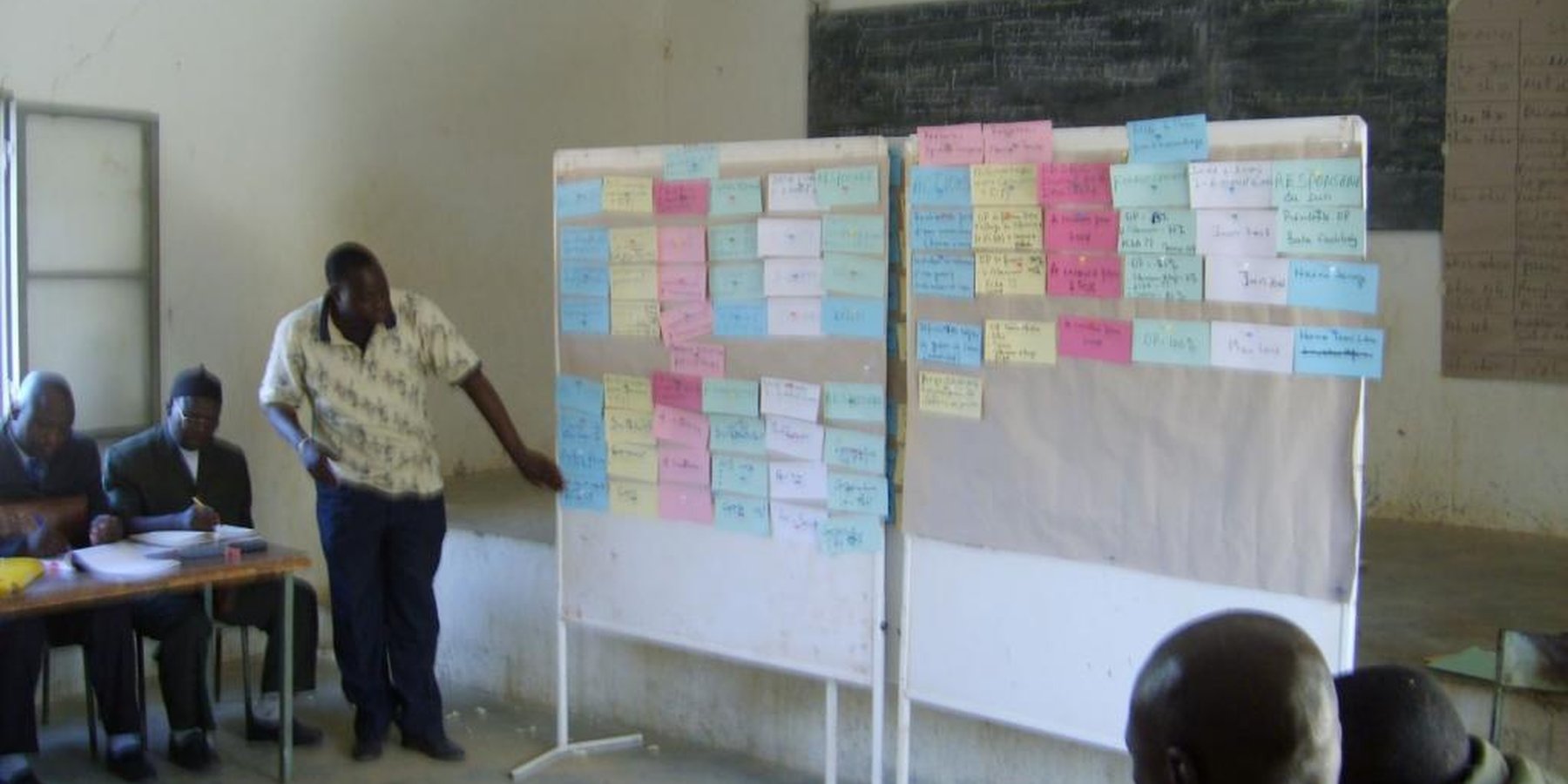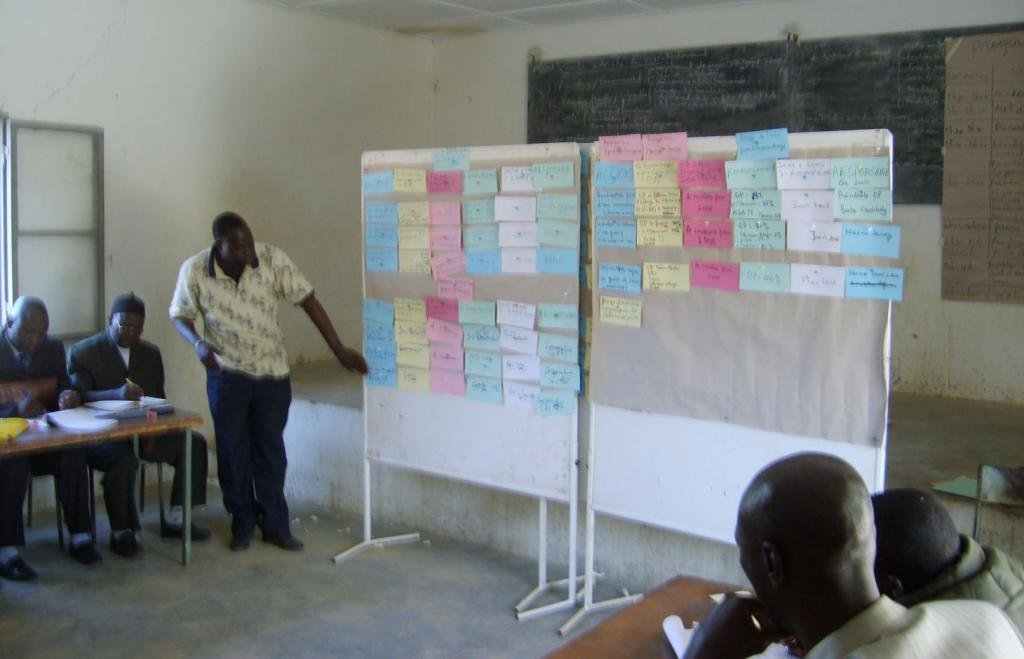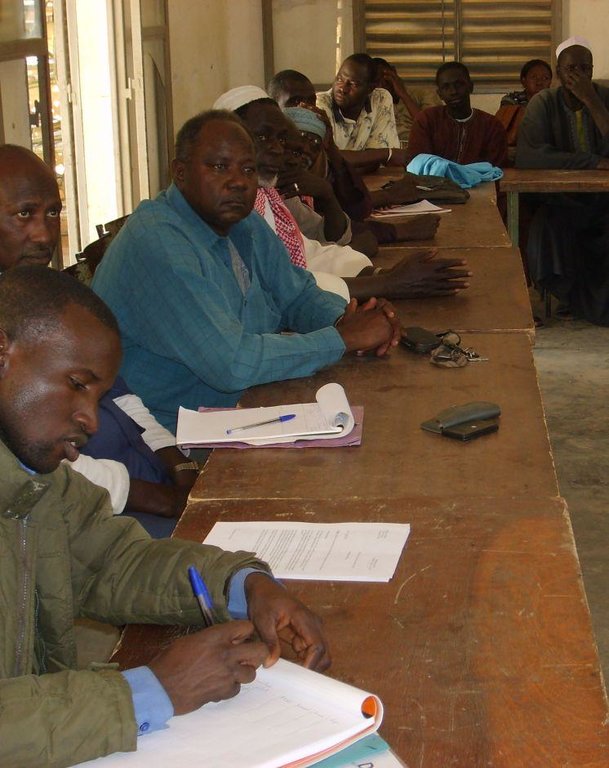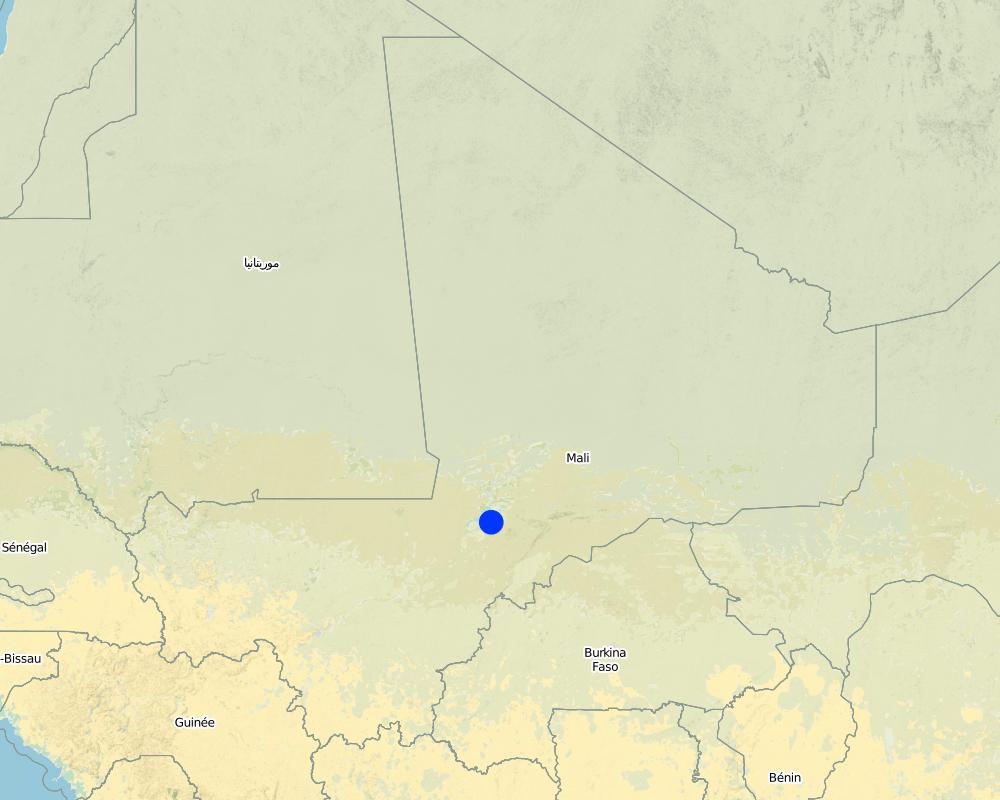Establishment and support of coordination platforms for commune and private sector collaboration [Mali]
- Criação:
- Atualização:
- Compilador/a: Dieter Nill
- Editor: –
- Revisor: Laura Ebneter
Mise en place et accompagnement des cadres de concertation entre la commune et le secteur prive
approaches_2512 - Mali
Veja as seções
Expandir tudo Recolher tudo1. Informação geral
1.2 Detalhes do contato das pessoas capacitadas e instituições envolvidas na avaliação e documentação da abordagem
Especialista em GST:
Cisse Dieneba
dieneba.cisse@giz-pact.org
Deutsche Gesellschaft für Internationale Zusammenarbeit (GIZ)
Mali
Nome do projeto que facilitou a documentação/avaliação da Abordagem (se relevante)
Programme for Territorial Communities, Mali (PACT)Nome da(s) instituição(ões) que facilitou(ram) a documentação/avaliação da Abordagem (se relevante)
Deutsche Gesellschaft für Internationale Zusammenarbeit (GIZ) GmbH (GIZ) - Alemanha1.3 Condições em relação ao uso da informação documentada através de WOCAT
Quando os dados foram compilados (no campo)?
01/07/2012
O/a compilador/a e a(s) pessoa(s) capacitada(s) aceitam as condições relativas ao uso de dados documentados através da WOCAT:
Sim
2. Descrição da abordagem de GST
2.1 Descrição curta da abordagem
Facilitate dialogue between commune representatives and sector players in order to direct investments and commune services towards the real needs of professionals.
2.2 Descrição detalhada da abordagem
Descrição detalhada da abordagem:
Consultation frameworks aim to facilitate dialogue between commune representatives and sector players in order to direct investments and commune services towards the real needs of professionals in the sectors in question.
The approach involves instituting a consultation framework for local authority actors and professionals from economic sectors in order to identify these economic actors’ needs vis-à-vis community investments, to factor these needs into local and regional authority planning, and to promote trust and collaboration between actors.
The commune identifies two or three high-growth sectors that are a priority for the commune and also identifies the actors (groups, cooperatives, associations) operating in these sectors. It then puts a consultation framework in place that brings together the municipality, sector actors, local technical services, representatives from technical and funding partners, and NGOs appropriate to or operating in the sectors in question. The decision to establish a framework is made on the back of commune council deliberations. Prior to the first consultation framework meeting, sector professionals identify their needs in terms of investments and measures to improve the business environment. During these periodic meetings, attendees negotiate and agree on priority actions and write these up in a very short-term (three-month) action plan. The consultation framework group then moves to install an inclusive monitoring committee to oversee the implementation of the action plan. The committee’s mandate is defined and evolves in accordance with the results that are achieved over time and with new needs arising. The successive nature of the consultation framework meetings means that progress can be measured, required adjustments made and new activities programmed to move the sectors forward.
PACT provides technical support (methods and tools for work, moderation and training) and contributes financially to consultation workshops. The commune formalises the framework, organises the logistics of meetings (invites, meeting rooms, chair hire, accommodation), contributes to implementing the action plan (registering its designated actions with PDESC, financing), provides incentives (supporting the training of cooperatives; land access; linking up actors; acting as intermediary in negotiations among cooperatives, technical and financial partners and NGOs). Professional organisations mobilise and train their members, cover the costs of their designated activities (radio reports, member travel arrangements, opening accounts, etc.), identify and negotiate within each individual profession the required actions for inclusion in the action plan, and contribute to the cost of building infrastructure. Technical services provide technical support to the two main parties (municipality and professional organisations). The monitoring committee helps ensure the action plan is implemented on schedule, identifies obstacles to implementation and communicates these to consultation framework actors so they can find solutions and move forward with a new action plan.
2.3 Fotos da abordagem
2.5 País/região/locais onde a abordagem foi aplicada
País:
Mali
Região/Estado/Província:
Mali
Especificação adicional de localização:
regions of Ségou and Koulikoro
Map
×2.6 Datas de início e término da abordagem
Indique o ano de início:
2007
2.7 Tipo de abordagem
- Baseado em projeto/programa
2.8 Principais metas/objetivos da abordagem
Consultation frameworks aim to facilitate dialogue between commune representatives and sector players in order to direct investments and commune services towards the real needs of professionals in the sectors in question.
The SLM Approach addressed the following problems: lack of dialogue between commune representatives and sector players
2.9 Condição que propiciam ou inibem a implementação de tecnologia/tecnologias aplicada(s) segundo a abordagem
Quadro institucional
- Inibitivo
lack of dialogue between commune representatives and sector players
Treatment through the SLM Approach: instituting a consultation framework for local authority actors and professionals from economic sectors in order to identify economic actors’ needs and to factor these needs into local and regional authority planning, to promote trust and collaboration between actors.
3. Participação e papel das partes interessadas envolvidas
3.1 Partes interessadas envolvidas na abordagem e seus papéis
- Usuários de terra/comunidades locais
- Especialistas em GST/ consultor agrícola
- Governo local
- Governo nacional (planejadores, responsáveis pelas decisões)
- Organização internacional
3.2 Envolvimento do usuários de terra/comunidades locais nas diferentes fases da abordagem
| Envolvimento do usuários de terra/comunidades locais | Especifique quem estava envolvido e descreva as atividades | |
|---|---|---|
| Iniciação/motivação | Passivo | |
| Planejamento | Participativo | |
| Implementação | Participativo | |
| Monitoramento/avaliação | Participativo | The monitoring committee helps ensure the action plan is implemented on schedule, identifies obstacles to implementation and communicates these to consultation framework actors so they can find solutions and move forward with a new action plan |
| Research | Passivo |
3.4 Decisão sobre a seleção de tecnologia/tecnologias de GST
Especifique quem decidiu sobre a seleção de tecnologia/tecnologias a serem implementadas:
- Principalmente especialistas em GST, após consulta com usuários da terra
Explique:
Decisions on the method of implementing the SLM Technology were made by mainly by SLM specialists with consultation of land users
4. Suporte técnico, reforço das capacidades e gestão do conhecimento
4.1 Reforço das capacidades/ formação
Foi oferecida formação aos usuários da terra/outras partes interessadas?
Sim
Especifique quem foi capacitado:
- Usuários de terra
Caso seja relevante, especifique gênero, idade, status, etnia, etc.
Training provided/supported by PACT, the commune, professional organisations
Tipo de formação:
- Reuniões públicas
4.2 Serviço de consultoria
Os usuários de terra têm acesso a um serviço de consultoria?
Sim
Descreva/comentários:
Name of method used for advisory service: technical support (methods and tools for work, moderation and training), financial contribution
4.3 Fortalecimento da instituição (desenvolvimento organizacional)
As instituições foram fortalecidas ou estabelecidas através da abordagem?
- Sim, significativamente
Especifique a que nível (níveis) as instituições foram fortalecidas ou estabelecidas:
- Local
Especifique o tipo de apoio:
- Financeiro
- Reforço das capacidades/ formação
- Equipamento
4.4 Monitoramento e avaliação
Monitoramento e avaliação são partes da abordagem?
Sim
Comentários:
socio-cultural aspects were ad hoc monitored by project staff, land users through observations
economic / production aspects were regular monitored by project staff, land users through measurements
management of Approach aspects were ad hoc monitored by project staff through observations
There were no changes in the Approach as a result of monitoring and evaluation
There were no changes in the Technology as a result of monitoring and evaluation
4.5 Pesquisa
A pesquisa foi parte da abordagem?
Sim
Especifique os tópicos:
- Sociologia
- Economia/Marketing
5. Financiamento e apoio material externo
5.1 Orçamento anual para o componente de GST da abordagem
Comentários (p. ex. principais fontes de recursos/principais doadores):
Approach costs were met by the following donors: international: 100.0%
5.2 Apoio financeiro/material concedido aos usuários da terra
Os usuários da terra receberam apoio financeiro/material para a implementação de tecnologia/tecnologias?
Sim
Caso afirmativo, especifique tipo(s) de apoio, condições e fornecedor(es):
The beneficiaries (municipality and professional organisations) contribute to covering the costs involved. It is a win-win process for the municipality and professional organisations and the costs involved are low. Progress can potentially be restricted by the low-levels of resources that both the territorial communities (rural communes) and local economic actors can invest in infrastructure and the fact that PACT cannot make capital investments. This lack of investment can sap the desire of actors to continue with the consultation process.
5.3 Subsídios para entradas específicas (incluindo mão-de-obra)
- Equipamento
| Especifique quais entradas foram subsidiadas | Em que medida | Especifique os subsídios |
|---|---|---|
| Maquinário | Totalmente financiado | |
| Ferramentas | Totalmente financiado | |
Se a mão-de-obra pelos usuários da terra foi uma entrada substancial, isso foi:
- Recompensado com outras formas de apoio material
5.4 Crédito
Foi concedido crédito segundo a abordagem para atividades de GST?
Não
6. Análise de impactos e declarações finais
6.1 Impactos da abordagem
A abordagem auxiliou os usuários da terra a implementar e manter as tecnologias de GST?
- Não
- Sim, pouco
- Sim, moderadamente
- Sim, significativamente
consultation framework brings together the municipality, sector actors, local technical services, representatives from technical and funding partners, and NGOs; Commune water-use planning that takes into account commercial (e.g., small-scale irrigation schemes) as well as drinking water purposes
A abordagem concedeu autonomia aos grupos social e economicamente desfavorecidos?
- Não
- Sim, pouco
- Sim, moderadamente
- Sim, significativamente
Did other land users / projects adopt the Approach?
- Não
- Sim, pouco
- Sim, moderadamente
- Sim, significativamente
Ségou Region: Ségou Circle (communes of Dioro, Sansanding, Togou, Markala and Farakou Massa) and Macina Circle (communes of Boky-Wèrè, Kokry, Souleye, Saloba and Kolongo) Implementation locations: Koulikoro Region: Koulikoro Circle (communes of Sirakorala, Koula Togouni, Nyamina and Doumba) and Kati Circle (communes of Ouélessébougou, Dialakoroba, Sanankoroba, Dio-Gare and Yélékébougou). The approach has been applied in 20 communes in two regions and four circles. On average, each commune has two cooperatives, which are professional organisations representing between 60 and 120 members.
Did the Approach lead to improved livelihoods / human well-being?
- Não
- Sim, pouco
- Sim, moderadamente
- Sim, significativamente
trust and collaboration between actors; consultation framework brings together the municipality, sector actors, local technical services, representatives from technical and funding partners, and NGOs
Did the Approach help to alleviate poverty?
- Não
- Sim, pouco
- Sim, moderadamente
- Sim, significativamente
6.2 Principal motivação dos usuários da terra para implementar a GST
- Produção aumentada
- Lucro (lucrabilidade) aumentado, melhora da relação custo-benefício
- Pagamentos/subsídios
6.3 Atividades de sustentabilidade de abordagem
Os usuários da terra podem manter o que foi implementado através da abordagem (sem apoio externo)?
- Incerto
Caso negativo ou incerto, especifique e comente:
The most important factor in ensuring success is a willingness to collaborate on the part of the municipality (whose revenue is based on taxes paid by economic actors) and economic actors who have expectations with regard to the installation of infrastructure/community facilities for trade and to business opportunities that the municipality can facilitate. Levels of success are strongly linked to the support provided to the two main actors, namely:
1) training and support for the municipality in managing the local development, mobilising resources, and negotiating and developing partnerships;
2) training and support for economic actors in formalising the cooperative or company, mobilising and securing financial resources, setting up and managing projects, and negotiating and implementing partnerships.
6.4 Pontos fortes/vantagens da abordagem
| Pontos fortes/vantagens/oportunidades na visão do/a compilador/a ou de outra pessoa capacitada |
|---|
| The beneficiaries (municipality and professional organisations) contribute to covering the costs involved. It is a win-win process for the municipality and professional organisations and the costs involved are low. |
|
Formalisation of professional organisations and steering of these towards economic goals. Increased awareness in the municipality of the need to include economic factors in planning |
|
Commune water-use planning that takes into account commercial (e.g., small-scale irrigation schemes) as well as drinking water purposes |
|
collaborative relationship between the municipality and private sector (better mutual understanding of local authority and professional sector actors) |
| embedding of community structural investments in community planning |
| Greater willingness to pay taxes |
| creation of new funding streams for local authorities |
| empowerment of private sector actors in terms of investments |
| Improved basic community services for actors operating in sectors related to small-scale irrigation |
| Joint identification of needs (investments and capacity building of actors). |
6.5 Pontos fracos, desvantagens da tecnologia e formas de superá-los
| Pontos fracos/vantagens/riscos na visão do/a compilador/a ou de outra pessoa capacitada | Como eles podem ser superados? |
|---|---|
| Progress can potentially be restricted by the low-levels of resources that both the territorial communities (rural communes) and local economic actors can invest in infrastructure and the fact that PACT cannot make capital investments. This lack of investment can sap the desire of actors to continue with the consultation process. |
7. Referências e links
7.1 Métodos/fontes de informação
- visitas de campo, pesquisas de campo
- entrevistas com usuários de terras
7.2 Referências às publicações disponíveis
Título, autor, ano, ISBN:
Manual of Good Practices in Small Scale Irrigation in the Sahel. Experiences from Mali. Published by GIZ in 2014.
Disponível de onde? Custos?
http://star-www.giz.de/starweb/giz/pub/servlet.starweb
Links e módulos
Expandir tudo Recolher tudoLinks
Não há links
Módulos
Não há módulos





